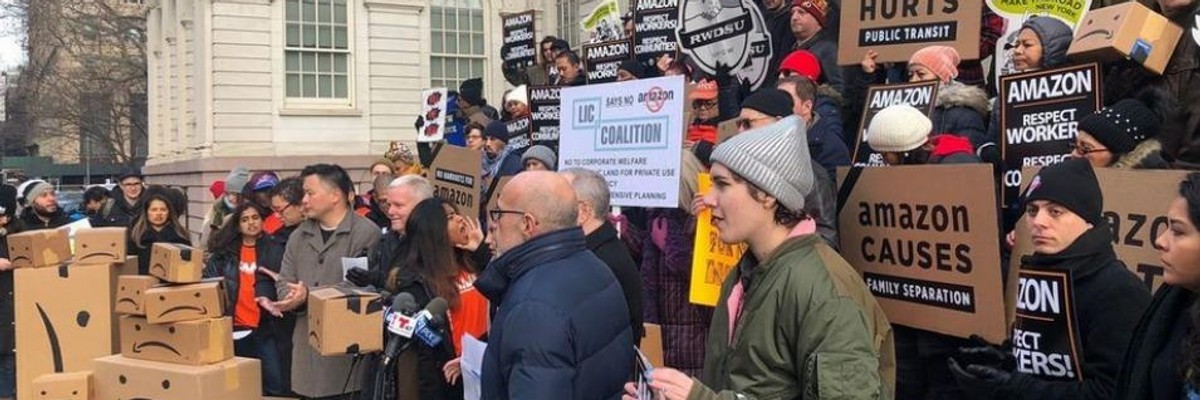After being kept in the dark about New York's $3 billion deal with Amazon, allowing the trillion-dollar corporation to build its new headquarters--complete with helicopter landing pad for CEO Jeff Bezos--in the Queens neighborhood of Long Island City, concerned New York City Council members and scores of angry New Yorkers on Wednesday angrily confronted company representatives over the plan.
At the first City Council meeting on Amazon's so-called "HQ2," about 150 protesters joined the mostly-Democratic lawmakers in slamming the closed-door process through which the city and state finalized the deal and the effect the corporation's arrival will likely have on affordable housing and community development in Queens and the entire city, as New York pours much-needed funds into the new one million square foot campus.
"Despite the familiar promises, Amazon is not a good partner. Not for the cities it occupies, not for the merchants who depend on it, not for the workers it employs. The company does not seek partnership; it seeks control." --Ron T. Kim and Zephyr Teachout
"You're worth a trillion dollars," New York City Council Speaker Corey Johnson said bluntly to Amazon officials Brian Huseman and Holly Sullivan. "Why do you need our $3 billion when we have crumbling subways, crumbling public housing, people without health care, public schools that are overcrowded?"
Amazon has said its arrival in New York will create 25,000 jobs for residents--a claim one protester derided as "smoke and mirrors" during the hearing--and has promised to fund a new school that would serve just 600 of the city's school children.
Huseman, Amazon's vice president for public policy, noted that 5,000 New York workers are already employed by the company at a fulfillment center on Staten Island--but as the hearing was underway those same employees were publicizing their effort to unionize, citing long hours, insufficient breaks, and safety concerns on the job.
The HQ2 deal was brokered by state and city officials including Gov. Andrew Cuomo, New York City Mayor Bill DeBlasio, and the Economic Development Corporation, headed by James Patchett. The officials bypassed public land use reviews which would have required the input of the City Council, including member Jimmy Van Bramer, who represents Long Island City's 68,000 residents.
"James, you disrespected this body with how you handled this process," Van Bramer told Patchett. "I think it's fundamentally unethical with what you have done. You should be ashamed of yourself."
The councilman also called on Amazon, whose CEO is the richest person on the planet, to simply build the headquarters with its own money and redirect the funds to public housing developments in the neighborhood.
Outside City Hall, State Assemblyman Ron T. Kim led protesters in a rally, calling the hearing a "first step" in holding Amazon accountable to the people of New York.
"Our current state, all of the hatred, all of the divisiveness that we are feeling right now on the ground--those are symptoms of a deeper problem. Of an economy that has been failing us for 40, 50 years," Kim said. "When the economy is failing we give trillions of dollars to big banks, when the economy is booming we're giving billions of dollars to mega-corporations...There's an opportunity right now to undo this. Unrig the system. This is the first step--getting clarity, transparency, and focusing on the process."
As rumors swirled last month about HQ2, just before Amazon announced that it would build one campus in New York and one in Arlington, Virginia, Kim joined former attorney general candidate Zephyr Teachout in warning against welcoming the company to New York, referencing the skyrocketing home prices and community erosion that's resulted from Amazon's presence in Seattle.
"If Amazon indeed locates a substantial part of its business in New York, serfdom is the style of 'partnership' the city should expect," Kim and Teachout wrote in a New York Times op-ed. "Despite the familiar promises, Amazon is not a good partner. Not for the cities it occupies, not for the merchants who depend on it, not for the workers it employs. The company does not seek partnership; it seeks control. Seattle's experience shows that becoming dependent on Amazon did not lead to broader wealth; it has pushed up home prices and led to increased homelessness. Amazon also threw its political weight around in the city, spending millions in a brutal campaign to resist corporate taxes in Seattle.
"It would be a special insult in New York City to sell out to a company so closely identified with squashing small merchants, stifling workers' rights, and undermining the publishing and ideas industry," they added.

